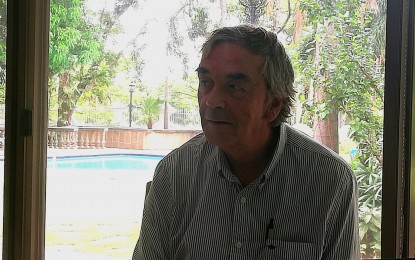News
PH gets first-ever volcanic lake monitoring system from Belgium

FILE: Volcanologist Alain Bernard discusses the Belgian project concerning the monitoring of Taal Volcano at the residence of Belgian Ambassador Michel Goffin. (Photo by Joyce Ann L. Rocamora via PNA)
MANILA — The Philippines can now further monitor Taal Volcano and possibly detect an impending eruption through a volcanic lake monitoring system given by Belgium.
In a recent lunch meeting at the residence of Belgian Ambassador Michel Goffin, Prof. Alain Bernard, a volcanologist who had been studying the Taal Volcano since 2014, introduced the instrumentation to monitor Taal’s main crater lake to stakeholders and members of the press.
“It’s real-time monitoring so we can detect change within the volcanic lake,” he told the Philippine News Agency (PNA), saying the system could help see signs of increased volcanic activity by measuring the peaks in carbon dioxide from underground magma released through the lake.
By analyzing these changes, early detection of a volcanic eruption may be possible, he said.
“The slight increase in the parameter may be the sign of a coming eruption, so we have real-time monitoring.”
Taal Volcano is one of the most active volcanoes in the Philippines with about 6,000 people living near the main crater.
“Taal is one of the most active volcanoes in the Philippines, that’s why it’s closely monitored,” Raymond Patrick Maximo, a science research specialist at the Philippine Institute of Volcanology and Seismology (Phivolcs) told the PNA.
“There are earthquakes that are felt there and as Prof. Bernard said, this corresponds to the peaks in carbon dioxide and (the surfacing) of fresh gases in the lake, which means there is indeed a volcanic activity,” he added.
Maximo said the Phivolcs monitors this carbon dioxide in addition to other parameters that could determine an impending eruption.
“We also need, of course, to look at other parameters, for example, the number of earthquakes, is it increasing?
But the instrument is very helpful because carbon dioxide is one of those that we closely monitor. Without that system, it would be difficult to pinpoint whether there is a magma coming out, or there is a fresh magma coming up the volcano,” he said.
Maximo said Bernard’s system has also been used in Indonesia and has helped predict the eruption of Mt. Kelud.
“His system is really important. It happened in Indonesia, he had a similar monitoring system. Three weeks before, he predicted the eruption of Kelud volcano,” Maximo said.
The installation of the monitoring system in Taal Lake is part of a Belgian research project funded by the Commission de la Coopération au développement (ARES-CCD) conducted from 2014 to 2019.
Bernard, who will be leaving the Philippines in August 2019, said the initiative is aimed at increasing the country’s capacity to reduce and mitigate the impact of future eruptions.





















